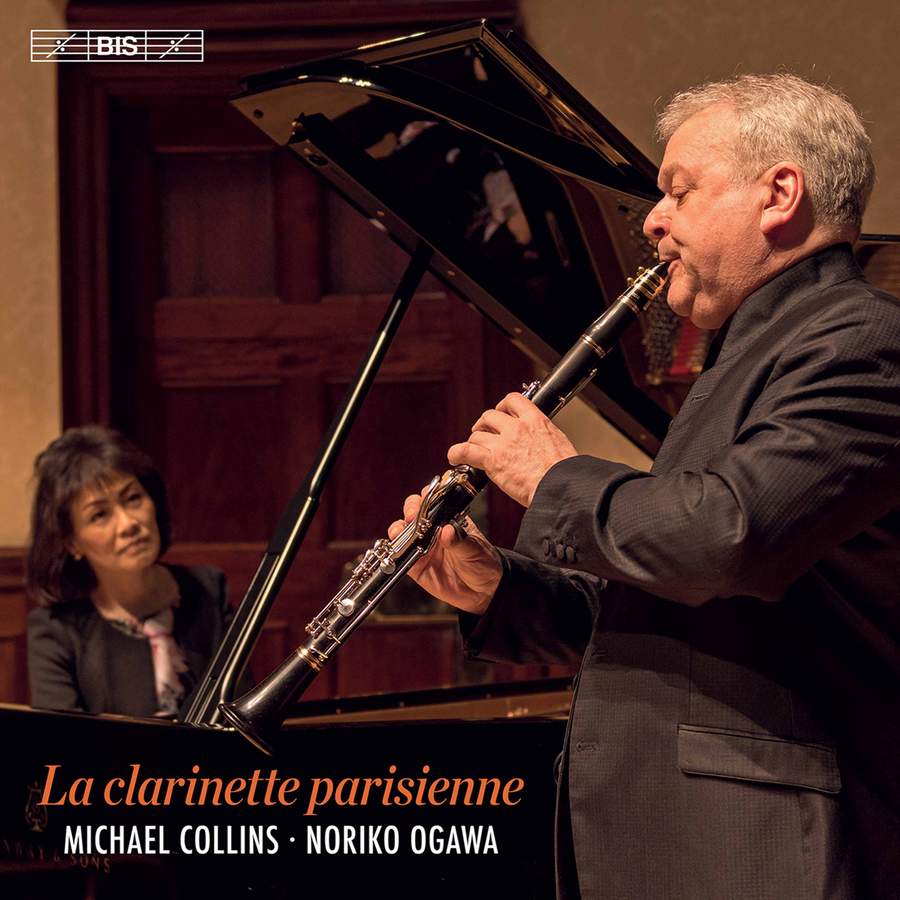Michael Collins: La Clarinette Parisienne
View record and artist detailsRecord and Artist Details
Genre:
Chamber
Label: BIS
Magazine Review Date: 09/2021
Media Format: Super Audio CD
Media Runtime: 62
Mastering:
DDD
Catalogue Number: BIS2497

Tracks:
| Composition | Artist Credit |
|---|---|
| Rhapsody for clarinet & piano (or orchestra), L. 116 'Première rapsodie' |
Claude Debussy, Composer
Michael Collins, Clarinet Noriko Ogawa, Piano |
| Introduction et Rondo |
Charles-Marie(-Jean-Albert) Widor, Composer
Michael Collins, Clarinet Noriko Ogawa, Piano |
| Sonata for Clarinet and Piano |
Camille Saint-Saëns, Composer
Michael Collins, Clarinet Noriko Ogawa, Piano |
| Solo de Concours for Clarinet & Piano |
André (Charles Prosper) Messager, Composer
Michael Collins, Clarinet Noriko Ogawa, Piano |
| Solo de Concours |
Henri Rabaud, Composer
Michael Collins, Clarinet Noriko Ogawa, Piano |
| Sonata for Two Clarinets |
Francis Poulenc, Composer
Michael Collins, Clarinet Noriko Ogawa, Piano |
Author: Tim Ashley
Michael Collins and Noriko Ogawa’s survey of French clarinet music interweaves sonatas by Poulenc and Saint-Saëns with four works written around the turn of the 20th century as examination or competition pieces for students at the Paris Conservatoire, where the authorities, Stephen Johnson tells us in his booklet-note, were anxious to foster a French tradition of playing and repertory that would rival more established traditions in Germany. Debussy’s Première rapsodie (1910), later orchestrated, is the most familiar of the four, though each of the others, in its way, is attractive. The Introduction to Widor’s Rondo (1898) meanders a bit but the Rondo itself has plenty of bittersweet charm. The impetuosity of Messager’s 1899 Solo de concours, meanwhile, contrasts with Henri Rabaud’s altogether more austere work of the same name from 1901, all Bach-like flourishes, walking piano basses and counterpoint.
Only the Messager, with its central cadenza and a difficult, extrovert galop as coda, aims at being an overt display piece, and Collins and Ogawa have great fun with it in a performance that is exhilarating in its dash and verve. The other three composers were to some extent as much interested in exploring the clarinet’s expressive potential as in testing the player’s technique. Première rapsodie sounds wonderfully sensuous, as Collins allows the stream of sound and melody to unfold as a single arc, while Introduction et Rondo probes the deeper resonances that lurk beneath the surface elegance. In all three, Ogawa is a discreet if consistently insightful accompanist. Rabaud, however, breaks the mould by making piano and clarinet equal partners. You get a real sense of almost instinctive give and take between Collins and Ogawa here, an approach that also characterises their performances of the altogether darker Saint-Saëns and Poulenc Sonatas for clarinet and piano, both written late in their respective composers’ careers.
Ogawa and Collins dig deep into the Saint-Saëns (1920), in which the dark, unruly emotions of the Lento fracture the almost Mozartian grace of the opening movements before the initially effusive finale evaporates into sadness. The climax comes with a series of stark, dissonant piano arpeggios, which Ogawa plays with almost shocking intensity. Poulenc’s Sonata (1962), a tribute to Honegger, who died a few years previously, oscillates between nostalgia and grief before the impish finale chases sorrow away once and for all. The central Romance, with its aching, long-breathed melody, is ravishingly done, while the humour and virtuosity of the closing pages are utterly captivating. It’s prefaced by the brief, Stravinskian Sonata for two clarinets from 1918, one of Poulenc’s earliest works, in which Collins is joined by Sérgio Pires for a performance of impertinent wit and bravado. A most engaging disc, beautifully done.
Discover the world's largest classical music catalogue with Presto Music.

Gramophone Digital Club
- Digital Edition
- Digital Archive
- Reviews Database
- Full website access
From £8.75 / month
Subscribe
Gramophone Full Club
- Print Edition
- Digital Edition
- Digital Archive
- Reviews Database
- Full website access
From £11.00 / month
Subscribe
If you are a library, university or other organisation that would be interested in an institutional subscription to Gramophone please click here for further information.




